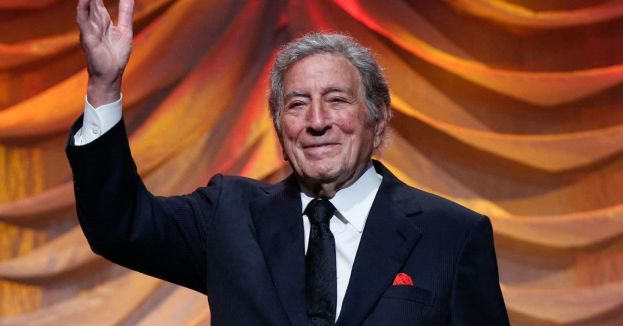Drafted into the U.S. Army at the age of 18 in 1944, Bennett began his military service a year later, following the heavy casualties suffered by the Allied Forces at the Battle of the Bulge.
Bennett's wartime experiences profoundly shaped his perspective on life and his opposition to war. In his 1998 autobiography, "The Good Life," he reflected on the impact of his military service, stating, "The main thing I got out of my military experience was the realization that I am completely opposed to war... life can never be the same once you've been through combat."
After being drafted, Bennett completed his basic training at Fort Dix, New Jersey, before being assigned as an infantry rifleman at Fort Robinson, Arkansas. In late 1944, he was sent to Le Havre, France, where he joined the 255th Infantry Regiment, 63rd Infantry Division, known as the "Blood and Fire" division. Bennett was part of a group of replacement troops sent to refill the ranks of units that had suffered heavy losses during the Battle of the Bulge.
WATCH: BIDEN CLAIMS INFLATION WAS 9% WHEN HE GOT IN OFFICE![]()
Marc Myers, a contributor for the Wall Street Journal and author of "Anatomy of a Song," had the opportunity to interview Bennett multiple times, including discussions about his military service. Myers shared, "Tony was certain he was going to die... He just knew it. He just felt it. And he went."
WATCH VIVEK: "WHAT IS THE CRIME THAT DONALD TRUMP COMMITTED?"![]()
July 23, 2023
Bennett's recollections of his time on the front lines paint a vivid picture of the horrors of war. He described the snow-covered ground and the front lines as a "front-row seat in hell." The lack of training for many troops and the necessity of digging foxholes in frozen ground added to the horror. Bennett learned a valuable lesson during his time as a rifleman: "When you're on the front line, don't move. Do not move, because if you move, you're going to get spotted."
NIGHT OPERATION UNCOVERS THE TRAGIC FATE OF THREE MUSICAL FESTIVAL HOSTAGES IN GAZA TUNNEL![]()
The nightly bombings and the sight of dead soldiers and horses left an indelible mark on Bennett. He expressed his disdain for war movies that portrayed war as an adventure, stating, "War is far more horrifying than anything anyone could dream up."
In March 1945, Bennett and his company pushed into Germany, engaging in house-to-house combat to liberate German towns from the Nazi armed forces. During this time, Bennett and approximately 1,000 other troops had the opportunity to attend a USO show featuring legendary entertainer Bob Hope. Bennett was captivated by Hope's optimism and ability to win over a crowd. He later wrote, "He became a big part of the reason I went into show business because at that moment he made me realize that the greatest gift you can give anyone is a laugh or a song."
ANIMAL PRIDE: NBC'S UPCOMING 'QUEER PLANET' EXPOSES NATURE’S HIDDEN LGBTQ+ LIFE![]()
Bennett's final mission took him and his company to a concentration camp south of the Dachau Concentration Camp in Germany. Unlike many other camps that had been abandoned by the Germans, this camp still had soldiers defending it. Bennett's unit had to fight their way to the camp, encountering the horrifying sights and the desperate faces of the survivors. Bennett recalled, "They had been brutalized for so long, they couldn't believe that we were there to help them and not to kill them."
WILL BIDEN’S DEBATE DEMANDS TURN THE TIDE OR DROWN HIS CHANCES?![]()
Marc Myers shared that Bennett would tear up when recalling the horror and fear on the faces of the survivors. It took time for the survivors to trust that the Allied forces were there to help. Bennett took charge of providing food, medical care, and logistics for the survivors.
CAPITOL RECOGNITION: A TRUE AMERICAN EVANGELIST EARNS BIG HONOR...![]()
World War II in Europe ended on May 8, 1945, with Germany's unconditional surrender. Since Bennett had only served for four months, he remained with the occupying forces. He was transferred to a Special Services unit, where he entertained the remaining Allied soldiers as part of the 314th Army Special Services Band under the name Joe Bari.
NO SO MAGICAL: THE COPPERFIELD-EPSTEIN CONNECTION THAT'S RAISING EYEBROWS EVERYWHERE![]()
During this time, Bennett faced racial segregation in the military. He was demoted and assigned to grave-digging duty for sharing Thanksgiving dinner with a Black soldier, a friend from school. The armed forces were segregated at the time, and Bennett's experience with racial segregation drove him to become a civil rights activist. He later marched alongside Martin Luther King Jr. at Selma.
UNBELIEVABLE! NEW OFFER ON TABLE FOR PRO-HAMAS PROTESTERS AT SUNY COLLEGE (VIDEO)![]()
A week after being demoted, Bennett's talent caught the attention of a colonel who transferred him to an orchestra. It was during this time that he once again encountered Bob Hope, who gave him the stage name Tony Bennett.
In 1946, Bennett returned home to New York and was honorably discharged on August 15. Stepping back onto American soil, he felt like a completely different person. He had developed a heightened sense of empathy, gratitude for life, and a keen awareness of justice and injustice.
BIDEN’S HONORARY DEGREE: A SYMBOL OF DIVISION AT MOREHOUSE COLLEGE?![]()
Tony Bennett's military service during World War II profoundly impacted his life and career. His experiences on the front lines and his encounters with the horrors of war shaped his opposition to violence and his commitment to using his talents to bring joy and laughter to others. Bennett's journey from the battlefield to the stage is a testament to the resilience of the human spirit and the power of music to heal and inspire.








 Discover alternative ideas that will make you think
Discover alternative ideas that will make you think Engage in mind bending debate
Engage in mind bending debate Earn points, rise in rank, have fun
Earn points, rise in rank, have fun


